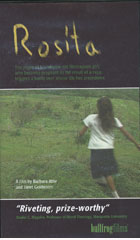
Rosita 2005
Distributed by Bullfrog Films, PO Box 149, Oley, PA 19547; 800-543-FROG (3764)
Produced by Barbara Attie and Janet Goldwater
Directed by Barbara Attie and Janet Goldwater
VHS, color, 57 min.
Sr. High - Adult
Latin American Studies, Women's Studies
Date Entered: 01/12/2006
Reviewed by Brian Falato, University of South Florida Tampa Campus LibraryIn 2003, a nine-year-old Nicaraguan girl named Rosita became the center of a cause celebre in Costa Rica. Raped by a neighbor on her way to school, she became pregnant and the focus of an intense controversy over whether the pregnancy should be carried to term or she should have an abortion. Her parents wanted the abortion, but they had to battle the Catholic Church and the governments of Costa Rica and Nicaragua in order to do so.
Rosita’s parents, Francisco and Maria, moved from Nicaragua to Costa Rica with their only child to better themselves economically. Francisco found work on a coffee farm. Rosita attended school, walking there with her two cousins. Along the way, a neighbor would talk to them and invite the children to pick tangerines from his trees.
One day, when Rosita was walking ahead of her cousins, the man once again invited her onto his property, but this time grabbed her, took her inside a shed, and raped her. After the ordeal, Rosita continued on her way to school and said nothing to her cousins or her parents. A couple of months later, after learning Rosita was pregnant, they finally heard from Rosita what had happened. She told her parents she had not said anything because she thought they would be mad at her.
The story became a sensation in Costa Rica and Nicaragua. More coverage was spent on the amazement that a nine-year-old was pregnant than that it was caused by a rape. Doctors kept Rosita in a hospital rather than letting her go home with her parents, and the Costa Rican Minister of the Family wanted the state to take custody of Rosita, ostensibly for her protection, but also because there was talk the parents wanted the girl to have an abortion.
Abortion in Costa Rica is illegal except when the mother’s life is endangered. A doctor at first seemed to clear the way for an abortion by saying that Rosita wasn’t prepared physically, biologically, or emotionally to give birth. But after a local priest made Rosita the topic of masses and said that even if there were risks to the child, an abortion should not be performed, the doctor reversed his decision, saying there was no danger.
Activists from the Nicaraguan organization Network of Women Against Violence came to Costa Rica and helped Rosita’s parents get their daughter released from the hospital and secretly return to Nicaragua (it had to be in secret because the government would have stopped them if they knew about the family leaving). After much searching in Nicaragua, they finally found health workers who would perform an abortion.
Much of the story is told in a Spanish-accented English voiceover that is a translation of material from journalist María López Vigil’s book on Rosita. It includes many quotes from Rosita, heartbreaking in their simplicity as she struggles to understand what is going on. There are also interviews with those on both sides of the abortion debate. This video provides a glimpse into the views of childhood pregnancy and women’s rights in a region where the Catholic Church has much influence over public policy and is recommended for collections in Latin American and women’s studies, as well as medical ethics.